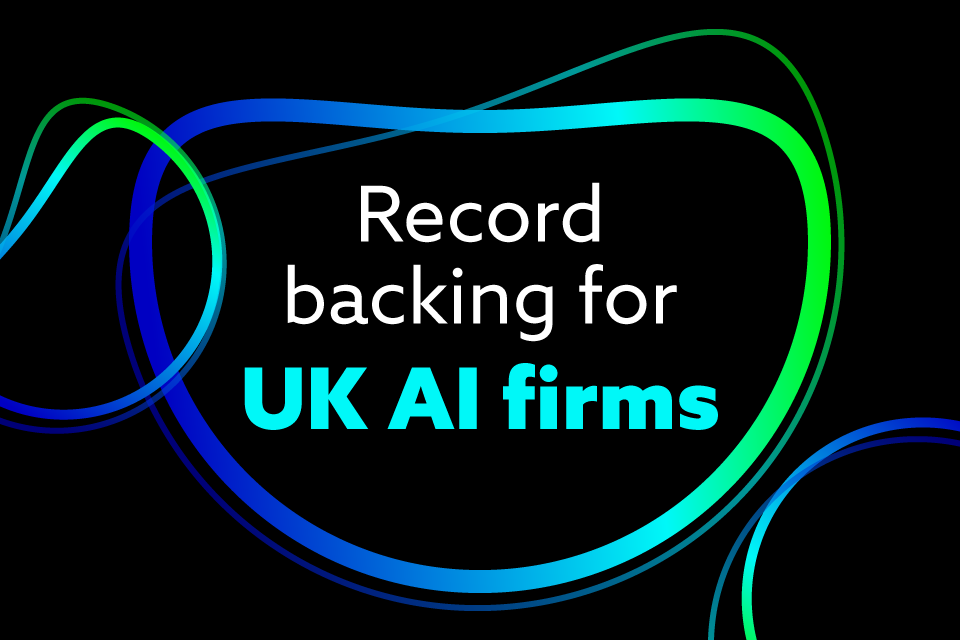Tools & Platforms
Urgent need for 'global approach' on AI regulation: UN tech chief – The Mountaineer

Tools & Platforms
Investment in British AI companies hits record levels as Tech Sec pitches UK as global magnet

- Record £2.9 billion invested in British AI companies last year – with average deals worth £5.9 million, fuelling the Plan for Change.
- Regulators, investors and tech companies urged to hammer home the UK’s enterprise and opportunity credentials, with plans to corner a new AI trust industry.
- Red tape to be slashed for regulators in key sectors of the economy – speeding up the delivery of ground-breaking innovations.
Investors and regulators are being urged to go further and faster to deliver new growth for the UK’s AI sector as part of the government’s modern industrial strategy, as new figures show backing for British AI firms hit record levels last year.
A total of £2.9 billion in private support and average deals worth £5.9 million has set the stage for further investment and new opportunities for both AI companies and financial backers alike.
It means British AI companies alone now contribute £11.8 billion to the UK economy – double the amount in 2023 – while AI employment tops 86,000 across the country. This record investment is unlocking new growth which will benefit communities – helping fuel further development and putting more money in people’s pockets through AI.
The figures also show at least double the number of AI companies are now based in the Midlands, Yorkshire, Wales and North West compared to just 3 years ago.
In a speech to city bosses and tech firms at Mansion House this evening, the Technology Secretary called on industry to step up and match the UK government’s ambition when it comes to AI – in a bid to drum up further investment and see more AI companies call Britain home.
He pointed to the government’s efforts to slash red tape, build infrastructure such as data centres and attract top talent – with a fresh push to work in partnership with industry to maintain the UK’s position as a world leader.
Addressing the room the Technology Secretary said:
We have learned the lesson of history: countries can only prosper if they get the big calls right, if they decide to go beyond the expected and embrace the future, to innovate not imitate – refusing to be constrained by the problems of today by taking up the challenges of tomorrow. In these uncertain times, I am certain that’s what it takes to get a global competitive edge.
We want you to keep investing here, keep building here – list here, scale here. If you invest in Britain, you’ll share in that competitive edge.
Chancellor of the Exchequer Rachel Reeves said:
This government is slashing burdensome red tape and making the conditions for record investment in AI, so that once again the UK can lead the way.
This country has huge potential, but our economy has been stuck on pause for too long. By giving companies the right environment to innovate, grow and create jobs we are changing that, delivering economic growth to put more money in working people’s pockets.
To capitalise on this momentum, the Technology Secretary has set out new plans to expand the UK’s AI offering, bolstering its sovereign AI capabilities by delivering new opportunities for the sector.
Public trust in the technology is key to its uptake – with more sectors of the economy primed to tap into the potential of AI.
It is a vital part of driving both workforce and investor confidence to spark the new jobs and economic growth which are already transforming communities. To capitalise on this potential, a new AI assurance roadmap launched today will look to add billions of pounds to the economy and create scores of new jobs by unlocking the growth of a key industry for the UK’s AI sector.
At its heart, AI assurance centres on ensuring independent experts can run the rule over AI systems – making sure they are trustworthy without leaving developers to mark their own homework. The government will now press ahead with plans to establish a dedicated AI assurance profession – bringing together key stakeholders from across the tech sector who will help strengthen the quality of this new standalone industry. This will support developers to better navigate and understand the regulatory landscape – saving time while also fostering public confidence and trust in the technology for users as its adoption is ramped up across the economy.
Its work will include the development of a professional code of ethics and detail the kind of access to models and systems that AI assurance professionals will need to carry out their work.
This will also give rise to a tailored skills and competencies framework that covers a range of areas from professional training and education to the establishment of a fully-fledged professional certification scheme.
Kicking off this work, a new AI Assurance Innovation Fund worth £11 million will be launched – with applications due to open in the Spring. This will support the development of new and innovative AI assurance tools to future-proof the market and ensure the UK is ready to response to rapid developments in AI capabilities – laying a foundation for a new industry geared towards growth and protecting the British public.
The announcements made today also include a new push from the Technology Secretary to slash regulatory burdens and get game-changing innovations for key sectors of the economy to market faster than ever before.
A £2.7 million boost will develop regulator capability in AI so that they are better able to streamline the regulatory environment and speed up the commercialisation of transformative technologies that will boost economic growth and improve the lives of the public.
Areas set to benefit from these plans include Ofgem being supported to develop an innovative AI tool to accelerate approvals for clean energy infrastructure, the Civil Aviation Authority using AI to analyse air accident reports and accelerate drone adoption, and the Office for Nuclear Regulation enabling the nuclear industry to use AI to safely and efficiently manage high risk nuclear waste.
Further Information:
Industry reaction to this evening’s announcements:
Sharron Gunn, Chief Executive of BCS, The Chartered Institute for IT said:
The government’s commitment to the creation of an AI assurance profession, whose practitioners are proud to be accountable to a code of ethics, is a huge step forward.
It’s also right that a consortium, including professional bodies, will be tasked with developing this Code, and with recommending the right paths for registrations and certifications for AI assurance.
The measures will grow this emerging market at the pace we need, and build public confidence that the people working on AI systems are responsible and trustworthy.
Tools & Platforms
AI-driven layoffs are on the rise. Could yours be next? Silicon Valley tech expert explains what to know

SAN FRANCISCO (KGO) — The Salesforce CEO made the announcement Tuesday about job cuts in a podcast saying he slashed thousands of jobs because of artificial intelligence.
“Salesforce is not the only one. I mean, Microsoft did this before. Meta did it and most of the basic programming is done by AI. The same thing with Google, Alphabet,” said Ahmed Banafa.
Banafa is a tech expert at San Jose State University. He says while many companies have cut jobs, they’re often times replacing them with new ones done by people who have AI skills.
Banafa says this so-called selective hiring is something many companies view as a good investment.
MORE: Nvidia’s CEO says artificial intelligence could lead to job losses ‘if the world runs out of ideas’
“They find that is going to replace a certain number of workers and staff, and this is reflected as cost cutting,” he said.
AI’s impact on the job market here in the Bay Area is being felt in a multitude of ways.
But employment is only one area of the economy where it’s having an effect according to real estate experts.
“Million square feet with OpenAI. Databricks took 300,000 in Sunnyvale just lately. These numbers don’t exist anywhere else in the world,” said Mark Ritchie.
MORE: Gov. Newsom introduces new initiative to help California’s workforce stay on cutting edge of AI
Ritchie specializes in commercial real estate here in the Bay Area. He tells ABC7 News while office vacancies in places like downtown San Francisco remain near all-time highs, there’s been a noticeable increase in AI companies taking out massive leases.
Despite that reality though, Ritchie doesn’t think those leases will be able to completely close the vacancy gap – at least not in the short term.
“Even with the large-scale employment and leases we see with AI compared to the previous tech booms and the scale of that hiring and those leases, this is not that large,” said Ritchie.
With the industry booming, Banafa says we’re likely to see even more AI disruption in the years to come. That’s why he encourages everyone to become versed in the new technology at least somewhat – in order to make them more competitive in the job market.
“AI is not going to take your job. The people who know how to use AI will take your job,” said Banafa.
Copyright © 2025 KGO-TV. All Rights Reserved.
Tools & Platforms
AI and Tech Empowering a New Generation of Traders

Artificial intelligence is no longer just a buzzword in finance — it’s the beating heart of the next generation of trading. But here’s the truth: the smartest algorithm in the world is only as powerful as the hardware it runs on. That’s where Marlinn Group is making its mark, bringing together bleeding-edge infrastructure and proprietary AI models to power its Marlinn Aggregator Pricing Bot (MAPB).
Hardware Meets Trading Intelligence
At the core of MAPB sits a custom AI stack built on:
NVIDIA Blackwell B200 & AMD MI300X GPUs — delivering the ultra-fast compute power needed to run transformer models in real time.
32TB LPDDR6 RAM & Intel Xeon Max CPUs — enabling parallel analysis of thousands of blockchain events per second.
Sub-microsecond execution relays via EigenLayer and Flashbots — ensuring trades settle faster than the competition.
This is not abstract capability — it’s raw horsepower that directly translates into profitable trades. While Nvidia’s own stock hovers around $172–174 per share, reflecting the global demand for AI infrastructure, Marlinn is putting that hardware to work in a way few others can: turning compute into capital.
MAPB in Action: Use Cases That Matter
Predicting the Future, Not Just the Present
Through its Quantum Predictive Mempool Intelligence, MAPB forecasts upcoming mempool patterns — not just pending transactions, but likely clusters of behavior. For traders, that means seeing the market’s next move before it happens.
Cross-Chain Capital Flow Without Friction
With its Autonomous Capital Routing Engine (ACRE), MAPB pulls liquidity across multiple blockchains in real time. Zero-knowledge bridges and Layer-2 rollups ensure trades execute atomically, without the risk of slippage or failed swaps.
Gas Efficiency as an Edge
Gas wars are often the difference between profit and loss. MAPB’s Neural Gas Fee Intelligence (NGFI) analyses congestion, validator behaviour, and time-of-day cycles, recalibrating fees at millisecond latency. Traders pay less, execute faster, and keep more of their profit.
Security That Evolves With the Threats

Why This Matters for Traders
Marlinn has already demonstrated MAPB’s consistency with a record of 98.2% profitable trades, and scalability that can cover 5–7.5% of the entire decentralized market trading volume. Combined with fast revenue distribution to account holders and fully auditable on-chain records, MAPB offers not just technology — but trust.
Riyan Verma, Marlinn’s Technology Director, sums it up best:
“The extraordinary gains in AI today aren’t possible without high-throughput infrastructure. Our integration of Blackwell, MI300X, and LPDDR6 memory empowers MAPB to predict, execute, and secure trades in ways the mainstream hasn’t seen yet. This is how we turn cutting-edge technology into real, measurable advantage for traders.”
The Future of AI in Trading
For Marlinn, this isn’t about chasing hype. It’s about building the blueprint for tomorrow’s financial infrastructure — where foresight, velocity, and security define profitability. In a world where milliseconds separate winners from losers, MAPB and its AI-driven hardware backbone are empowering a new generation of traders to stay ahead of the curve.
MAPB doesn’t just detect arbitrage; it defends itself. With the Zero-Knowledge Frontrun Shield (ZK-FS), proprietary trade logic is protected from competitors, while Self-Healing Smart Contracts patch vulnerabilities in real time, keeping capital safe.
Media Contact
Company Name: Marlinn Group
Contact Person: Media Manager
Email: Send Email
Country: United States
Website: www.marlinn.io
-

 Business5 days ago
Business5 days agoThe Guardian view on Trump and the Fed: independence is no substitute for accountability | Editorial
-
Tools & Platforms3 weeks ago
Building Trust in Military AI Starts with Opening the Black Box – War on the Rocks
-

 Ethics & Policy1 month ago
Ethics & Policy1 month agoSDAIA Supports Saudi Arabia’s Leadership in Shaping Global AI Ethics, Policy, and Research – وكالة الأنباء السعودية
-

 Events & Conferences4 months ago
Events & Conferences4 months agoJourney to 1000 models: Scaling Instagram’s recommendation system
-

 Jobs & Careers2 months ago
Jobs & Careers2 months agoMumbai-based Perplexity Alternative Has 60k+ Users Without Funding
-

 Education2 months ago
Education2 months agoVEX Robotics launches AI-powered classroom robotics system
-

 Funding & Business2 months ago
Funding & Business2 months agoKayak and Expedia race to build AI travel agents that turn social posts into itineraries
-

 Podcasts & Talks2 months ago
Podcasts & Talks2 months agoHappy 4th of July! 🎆 Made with Veo 3 in Gemini
-

 Podcasts & Talks2 months ago
Podcasts & Talks2 months agoOpenAI 🤝 @teamganassi
-

 Education2 months ago
Education2 months agoAERDF highlights the latest PreK-12 discoveries and inventions

















